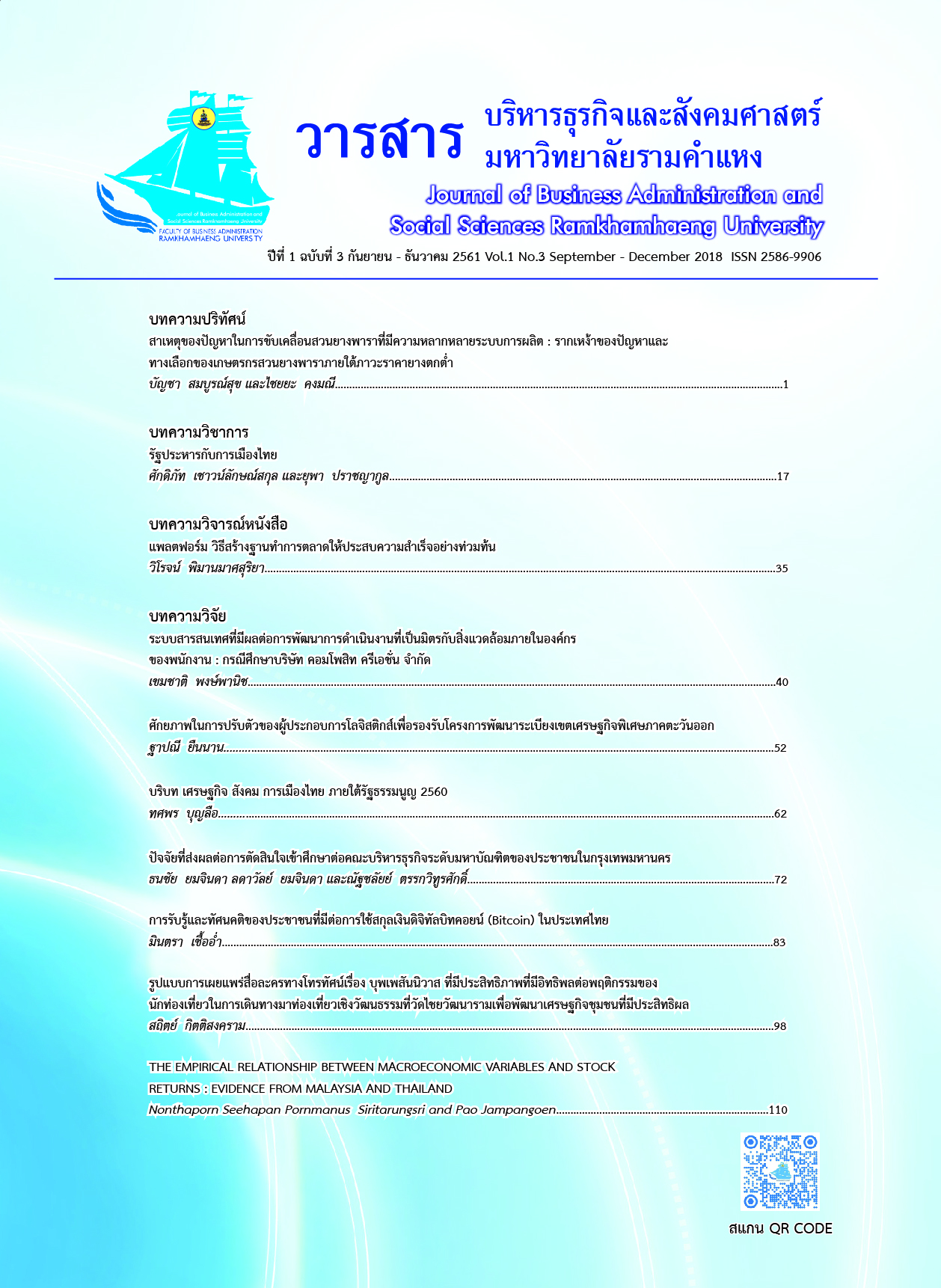COUPS AND THAI POLITICS
Main Article Content
Abstract
The two purposes of this article are: (1) To describe the context of Thai politics about coups in Thailand from past to present; and (2) To propose a model of Thai political coups from past to present. The study indicated that: (1) In the context of Thai politics from the traditional State, to the absolute monarchy State, and to the present modern State, coups and Thai politics continue as a vicious circle to the present, and it is concluded that Thai coups result from the conflict between Thai elites who grab the power of occupation from each other. (2) The model of Thai political coups depends on the balancing of power between the tripartite power of the new force, the old force, and the external force (i.e., world capitalism group). If there is a power imbalance, the old force and new force will grab the power (i.e., hegemony) by using discourse as a tool to legitimate the political action to grab the social ideology area. But the force which wins the occupation must be supported by the external force of the world capitalism group. So, the external force entirely judges the power of occupation.
Article Details
เนื้อหาและข้อมูลในบทความที่ลงตีพิมพ์ในวารสารบริหารธุรกิจและสังคมศาสตร์ มหาวิทยาลัยรามคำแหง ถือเป็นข้อคิดเห็นและความรับผิดชอบของผู้เขียนบทความโดยตรง ซึ่งกองบรรณาธิการไม่จำเป็นต้องเห็นด้วย หรือร่วมรับผิดชอบใดๆ
บทความ ข้อมูล เนื้อหา รูปภาพ ฯลฯ ที่ได้รับการตีพิมพ์ในวารสารบริหารธุรกิจและสังคมศาสตร์ มหาวิทยาลัยรามคำแหง ถือเป็นลิขสิทธิ์ของวารสารบริหารธุรกิจและสังคมศาสตร์ มหาวิทยาลัยรามคำแหง หากบุคคลหรือหน่วยงานใดต้องการนำบทความทั้งหมดหรือส่วนหนึ่งส่วนใดไปเผยแพร่ต่อ หรือเพื่อกระทำการใดๆ จะต้องได้รับอนุญาตเป็นลายลักษณ์อักษรจากวารสารบริหารธุรกิจและสังคมศาสตร์ มหาวิทยาลัยรามคำแหง ก่อนเท่านั้น
References
กุลลดา เกษบุญชู มี้ด. (2549). ทุนนิยมอังกฤษกับเอเชียตะวันออกเฉียงใต้ในศตวรรษที่ 19. ฟ้าเดียวกัน, 4(4), 94-109
กุลลดา เกษบุญชู มี้ด. (2556). กระบวนการเข้าสู่ความเป็นสากลของระบบทุนนิยมและลัทธิเสรีนิยมใหม่. วารสารสังคมศาสตร์ คณะรัฐศาสตร์ จุฬาลงกรณ์มหาวิทยาลัย, 43(2), 7-43.
จิตติภัทร พูนขำ. (2556). ทฤษฎีเศรษฐศาสตร์การเมืองระหว่างประเทศแนววิพากษ์ กุลลดา เกษบุญชู มี๊ด กับตำแหน่งแห่งที่ทางวิชาการในความสัมพันธ์ระหว่างประเทศ. วารสารสังคมศาสตร์ คณะรัฐศาสตร์ จุฬาลงกรณ์มหาวิทยาลัย, 43(2), 44-65.
ชัยอนันต์ สมุทวาณิช. (2552). รัฐ. กรุงเทพมหานคร: สถาบันนโยบายการศึกษา.
ธำรงศักดิ์ เพชรเลิศอนันต์. (2550). “ข้ออ้าง” การปฏิวัติ – รัฐประหาร – กบฏในเมืองไทยปัจจุบัน: บทวิเคราะห์และเอกสาร. กรุงเทพฯ: มูลนิธิโครงการตำราสังคมศาสตร์ และมนุษยศาสตร์.
นิธิ เอียวศรีวงศ์. (2549). การเมืองไทย สมัยพระนารายณ์. กรุงเทพฯ: มติชน
นิธิ เอียวศรีวงศ์. (2550). การเมืองไทยสมัยพระเจ้ากรุงธนบุรี. กรุงเทพฯ: มติชน
เพลิง ภูผา. (2559).13 รัฐประหารยึดอำนาจ บทเรียนประชาธิปไตยไทย. กรุงเทพฯ: สยามความรู้.
โรม บุนนาค. (2549). คู่มือรัฐประหาร. กรุงเทพฯ: ส.เอเชียเพรส (1989) จำกัด.
ศักดิภัท เชาวน์ลักษณ์สกุล. (2557). การสร้างรัฐ-ชาติสยามกับการควบรวมนครรัฐในล้านนา สมัยรัชกาลที่ 5. กรุงเทพฯ: มหาวิทยาลัยรามคำแหง.
สนั่น เหล่าประวัติชัย. (2558). รูปแบบการแก้ไขความขัดแย้งทางการเมืองในสังคมไทย. กรุงเทพฯ: มหาวิทยาลัยรามคำแหง.
สำนักงานเลขาธิการสภาผู้แทนราษฎร. (2550). การรัฐประหารในประเทศไทย. กรุงเทพฯ: สำนักงานเลขาธิการสภาผู้แทนราษฎร.
สุชิน ตันติกุล. (2557). รัฐประหาร 2490. กรุงเทพฯ: มติชน.
สุรชาติ บำรุงสุข. (2558). เสนาธิปไตย:รัฐประหารกับการเมืองไทย. กรุงเทพฯ: มติชน.
อุดม ตะนังสูงเนิน. (2535). พัฒนาการทางการเมืองในประเทศไทย. กรุงเทพฯ: เอ บี ดี ซี กรุ๊ฟการพิมพ์.
Cox, R. W. (1986). Social force, states. And word orders: Beyond international relations theory. In Keohane, R. O. (Ed.), Neorealism and its critics (204-254). New York: Columbia University Press.
Foucault, M. (1978). The history of sexuality: An introduction. New York: Vitage Books.
Foucault, M., & Sheriden, A. (1972). The archaeology of knowledge. New York: Panthcon Book.
Glassman, Jim. (2004). Thailand at the margins: Internationalization of the state and the transformation of labour. London: Oxford University Press.


